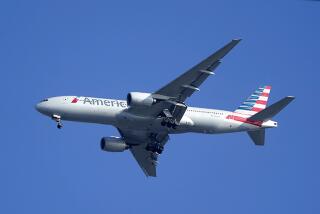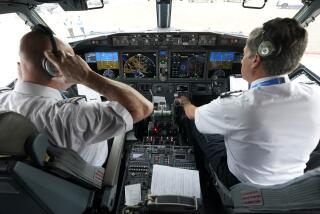U.S. Ready to Order Drug Testing of Airline Employees
- Share via
WASHINGTON — The Transportation Department on Thursday announced its long-expected plan to require widespread random drug testing of some 500,000 pilots, flight attendants, mechanics and other commercial aviation employees responsible for safety or security.
The regulations, which Transportation Secretary James H. Burnley IV said he hoped would be in effect by the end of the year, are subject to revision during the next three months, when airline companies, unions and other groups covered by the rules will have a chance to comment formally on them.
“Every day, millions of Americans put their trust and confidence in the aviation system and its workers,” Burnley said in a statement. “The abuse of drugs by airline employees is a life-threatening violation of that trust.”
Cites Public Confidence
Federal Aviation Administration chief Allan T. McArtor, who will be responsible for enforcing the regulations when they are formally imposed, added: “I can’t think of anything more essential to maintaining public confidence in flying than ensuring a drug-free aviation program.”
The airlines signaled that they generally support the plan. But aviation unions, which have opposed mandatory random drug testing for more than a year, quickly complained that Burnley’s proposal is flawed because it omits non-commercial aviation and because it fails to show that drug abuse is a safety problem in commercial aviation.
Burnley, pressed at a news conference to explain why he was proposing a tough drug-testing program for an industry that has no apparent drug problem, said he is not convinced that drugs have not found their way into the cockpit.
Won’t Wait for Midair Crash
“Unless you believe there is an invisible wall separating aviation from the rest of American society, there is no reason to think that aviation is exempt from the pervasive drug problems in America today,” Burnley said. “We are not going to wait until we get a midair collision to do something. We are not imposing on the industry anything different from what we have already imposed on ourselves.”
The Air Transport Assn., representing 97% of all commercial passenger and freight carriers, approved Burnley’s proposal in almost every particular.
“We fully support what Secretary Burnley said today,” spokeswoman Leslie Rowland said. She noted that the industry had proposed a similar program in late 1986, even before former Transportation Secretary Elizabeth Hanford Dole on Jan. 21, 1987, first broached the subject of drug-testing programs covering airlines, railroads, trucking and interstate buses.
Rowland added, however, that the airlines intended to oppose the Transportation Department’s suggestion that rehabilitation might be required for employees whose drug abuse was uncovered through random testing. “We feel that would dilute the effectiveness of the program,” she said.
The Air Transport Assn. believes that there has been no evidence of drug abuse as a safety problem among the nation’s commercial carriers. “But, if we can make it safer by doing this, then we should,” Rowland said.
The Air Line Pilots Assn., a union representing 34,000 commercial pilots, also argued that drugs have not jeopardized airline safety, and it rejected Burnley’s plan as an unnecessary intrusion into the privacy of pilots.
Vice President Roger Hall said that the union particularly opposes random testing of today’s pilots. But he supported testing as a condition of hiring commercial pilots, as an investigatory technique after an accident in which there is “reasonable cause” to suspect drug use and as part of a drug rehabilitation program.
“That parallels the alcohol abuse program we have had in place with the airlines for 14 years,” he said.
Hall complained also that Burnley’s regulations ignore general aviation--the thousands of non-commercial private and corporate pilots who add to traffic congestion at virtually every airport.
“You assume they are trying to enhance safety,” Hall said. “If so, how can you say general aviation doesn’t play a role in this? They fly in the same airspace we do. I think his program is flawed, that he is more interested in headlines than in addressing problems.”
The Transportation Department last September began random drug tests for all department employees in safety and security-related jobs. Burnley said that about 1,200 employees have been tested so far, and only eight have tested positive.
A similar testing program was imposed on the nation’s railroads in 1986--just in time to require post-accident testing of the train crew involved in a crash in the Washington-New York corridor in January, 1987, that killed 16 passengers.
Last month, a three-judge federal appeals panel in California struck down those regulations as an unconstitutional intrusion on the privacy of railroad workers. Burnley dismissed that ruling as “absurd” and said that the Administration intends to appeal it to the Supreme Court.
More to Read
Sign up for Essential California
The most important California stories and recommendations in your inbox every morning.
You may occasionally receive promotional content from the Los Angeles Times.













